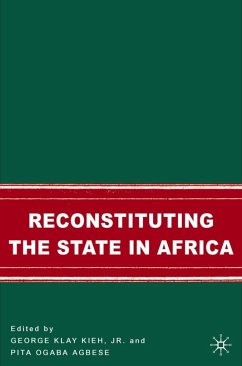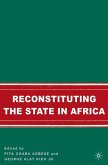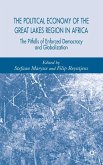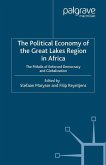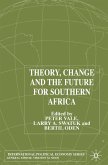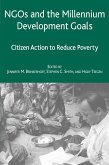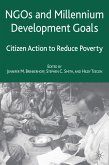Contributors to this volume highlight the failure and socio-economic and political problems of post-colonial African state and make constructive and convincing suggestions of how the problems can be addressed. They do not argue for the scrapping of the state but its reconstitution in ways that will enable it to be people's-oriented.
"The theme and arguments make enormous contribution to the literature."
- Chris W. Ogbondah, Professor of Communication Studies, University of Northern Iowa
"Nine African scholars have been brought together by Agbese and Kieh to explore the most important issue in contemporary Africa: how can the state be reconstituted so that it serves the people of the continent rather than systematically deepens their distress? In the search for answers, the authors report on the experiences ofseven pivotal countries. Few will question their depiction of the repressive, corrupt, and inefficient nature ofthe postcolonial African state. Some aspects of their reconstitution project will be challenged. All readers will benefit, however, from the frank exploration of the gains, setbacks and dilemmas of state reconstruction in an Africa buffeted by so many calamities."
- Richard Joseph, Director, Program of African Studies, Northwestern University
'This book makes a significant contribution to the debate on state reconstruction in Africa. Written by seasoned scholars of African Studies, this compilation contains a highly refreshing, rigorous and informative analysis of the failure of the postcolonial state to carry out its fundamental functions, which include the maximization of the collective well-being of its citizens. This collection differs significantly from previous efforts in that it not only identifies the reasons behind Africa's high levels of poverty and deprivation, as well as its continued marginalization in global affairs, but it also provides possible solutions. The contributing authors make a compelling case for democratic institutional reforms to found a state built on public sovereignty to replace the anachronistic, repressive, exploitative and insensitive state inherited from the European imperialist powers.'
- John Mukum Mbaku, Willard L. Eccles Professor of Economics, Weber State University, and author of Culture and Customs of Cameroon (2005)
- Chris W. Ogbondah, Professor of Communication Studies, University of Northern Iowa
"Nine African scholars have been brought together by Agbese and Kieh to explore the most important issue in contemporary Africa: how can the state be reconstituted so that it serves the people of the continent rather than systematically deepens their distress? In the search for answers, the authors report on the experiences ofseven pivotal countries. Few will question their depiction of the repressive, corrupt, and inefficient nature ofthe postcolonial African state. Some aspects of their reconstitution project will be challenged. All readers will benefit, however, from the frank exploration of the gains, setbacks and dilemmas of state reconstruction in an Africa buffeted by so many calamities."
- Richard Joseph, Director, Program of African Studies, Northwestern University
'This book makes a significant contribution to the debate on state reconstruction in Africa. Written by seasoned scholars of African Studies, this compilation contains a highly refreshing, rigorous and informative analysis of the failure of the postcolonial state to carry out its fundamental functions, which include the maximization of the collective well-being of its citizens. This collection differs significantly from previous efforts in that it not only identifies the reasons behind Africa's high levels of poverty and deprivation, as well as its continued marginalization in global affairs, but it also provides possible solutions. The contributing authors make a compelling case for democratic institutional reforms to found a state built on public sovereignty to replace the anachronistic, repressive, exploitative and insensitive state inherited from the European imperialist powers.'
- John Mukum Mbaku, Willard L. Eccles Professor of Economics, Weber State University, and author of Culture and Customs of Cameroon (2005)

